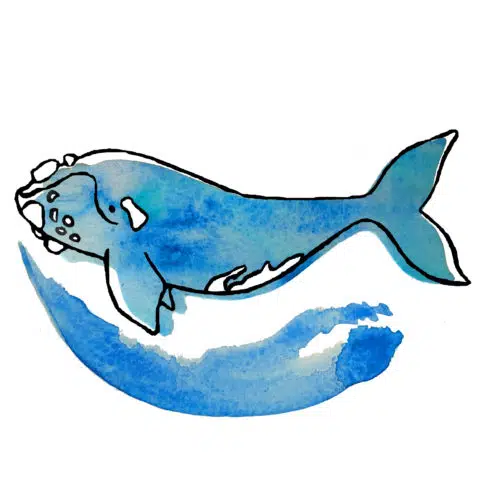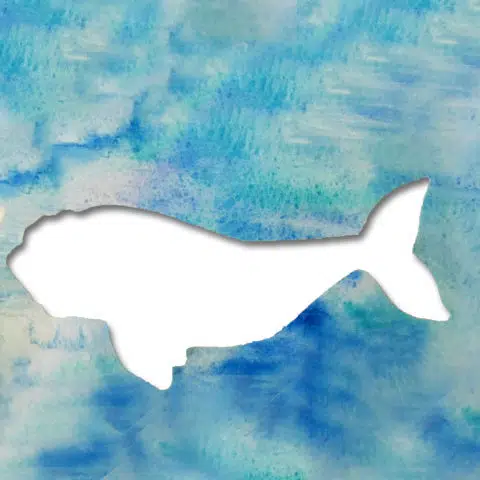
About North Atlantic Right Whales
North Atlantic right whales are historic inhabitants of the Gulf of Maine. They are urban whales, and they are our neighbors; they travel along the eastern coast of the United States and Canada to look for food and birth their young. Like all marine animals, they are vital to the health of the ocean ecosystem in their roles as predators and prey. A healthy whale population signifies a healthy ocean; a healthy ocean sustains all human communities.
Learn More About Right Whales

A SPECIES IN DANGER
Unfortunately, less than 450 of these majestic creatures survive in the North Atlantic today, and many scientists predict that they are likely to go extinct in the next 20 years if we do not intervene. The plight of North Atlantic right whales points to the overall threats facing our ocean today, including the impacts of climate change, increasing industrialization, and marine debris. Though inadvertently, it is humans who are harming the whales―and humans who can save them.
Take Action
Healthy Whale, Healthy Ocean Art Challenge
ART + ACTION
Bow Seat, in partnership with Conservation Law Foundation, launched the 2019 Healthy Whale, Healthy Ocean Challenge to engage local youth in using their creative voices to highlight the plight of North Atlantic right whales and the need for conservation of marine ecosystems and resources.
The Challenge invited K-12 students from the New England and Gulf of Maine regions in the U.S. and Canada to create visual art, poetry, and short films that celebrate this iconic species and inspire action for its protection.
View Artwork
“I created [my painting] to inspire people to be mindful of their impact on the ocean. By making this piece, I learned more than I was expecting to: I learned that the whales need our help, that they are beautiful, and that we need to act soon.”
– Eliza Goodwin, Age 17, Freeport, Maine
A Healthy Ocean Starts with You
TAKE ACTION
With barely 420 right whales alive today, we must do everything possible to make sure they stay safe and healthy. Here are some ways you can help protect North Atlantic right whales:
- Support the SAVE Right Whales Act. Congress recently reintroduced the Scientific Assistance for Very Endangered (SAVE) Right Whales Act, which would fund development, testing, and implementation of innovative technologies and other strategies to reduce human impact on right whales. You can help take action by calling on your representatives to take up and pass the SAVE Right Whales Act.
- Make your voice heard. The SAVE Right Whales Act is a good start, but the government could be doing more to protect right whales. You can let your representatives in Congress know that you also support a comprehensive monitoring plan in the Northeast with increased aerial and vessel surveys, as well as improved gear markings that help identify problematic gear and remove it as soon as possible.
- Report a right whale sighting. To protect the right whales, NOAA Fisheries has regulations that prohibit approaching or remaining within 500 yards (1,500 feet) of a right whale. Commercial and recreational boaters can help by reporting sightings through the Whale Alert smartphone app.
- Take individual actions at home. By decreasing your carbon footprint and refusing, reducing, reusing, and recycling single-use plastics, you can do your part to alleviate the impacts of global warming and marine debris that put right whales at risk.
- Share and spread awareness. North Atlantic right whales are in crisis and could become extinct in our lifetime without immediate action. By supporting the efforts of researchers and organizations working for the whales’ survival, speaking up for the conservation of ocean ecosystems, and sharing this issue with others, you can help protect our blue planet for all species.
